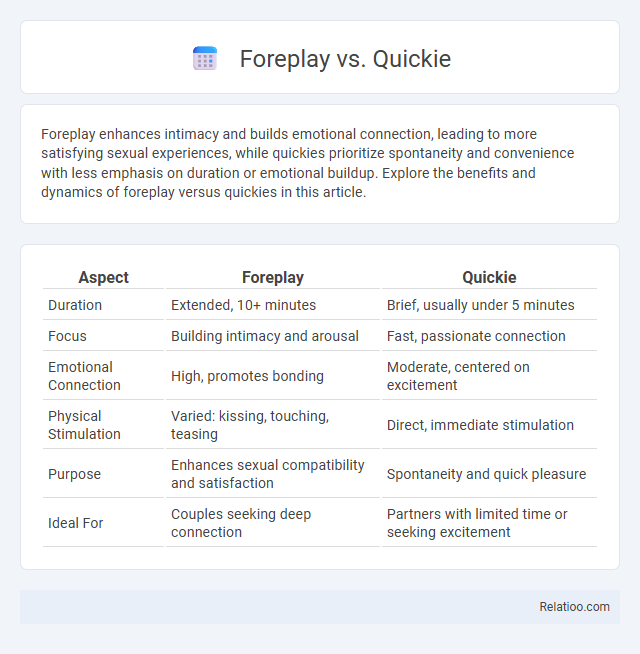Foreplay enhances intimacy and builds emotional connection, leading to more satisfying sexual experiences, while quickies prioritize spontaneity and convenience with less emphasis on duration or emotional buildup. Explore the benefits and dynamics of foreplay versus quickies in this article.
Table of Comparison
| Aspect | Foreplay | Quickie |
|---|---|---|
| Duration | Extended, 10+ minutes | Brief, usually under 5 minutes |
| Focus | Building intimacy and arousal | Fast, passionate connection |
| Emotional Connection | High, promotes bonding | Moderate, centered on excitement |
| Physical Stimulation | Varied: kissing, touching, teasing | Direct, immediate stimulation |
| Purpose | Enhances sexual compatibility and satisfaction | Spontaneity and quick pleasure |
| Ideal For | Couples seeking deep connection | Partners with limited time or seeking excitement |
Understanding Foreplay: The Art of Anticipation
Foreplay is the intentional build-up of sensual connection that heightens intimacy and anticipation before sexual intercourse. It enhances emotional bonding and physical pleasure by engaging multiple senses and fostering communication between partners. Unlike a quickie, which is brief and spontaneous, foreplay emphasizes extended touch, eye contact, and verbal exchange to deepen desire and satisfaction.
What Is a Quickie? Breaking Down the Basics
A quickie is a brief, spontaneous sexual encounter typically lasting only a few minutes, focusing on intense pleasure over extended intimacy. Unlike prolonged foreplay, which emphasizes gradual arousal and emotional connection, a quickie prioritizes speed and convenience, often suited for busy schedules or sudden desire. To enhance Your experience, understanding the difference between quickie and traditional foreplay helps tailor intimacy to fit different moods and time constraints.
Emotional Connection: Deepening Intimacy through Foreplay
Foreplay enhances emotional connection by fostering trust, communication, and anticipation between partners, which deepens intimacy and strengthens the bond. Quickies often prioritize physical satisfaction and spontaneity but may lack the emotional buildup that foreplay provides. Engaging in foreplay creates a shared experience that cultivates vulnerability and closeness, essential components for a fulfilling and emotionally connected sexual relationship.
Time and Place: When Quickies Make Sense
Quickies are ideal for busy schedules or spontaneous moments, typically lasting just a few minutes and suited for private, easily accessible locations. Foreplay, in contrast, involves extended, intentional time investments to build intimacy and arousal, often taking place in comfortable, private settings that allow for gradual connection. Quickies make sense during short breaks or when privacy is limited, while foreplay benefits from relaxed environments that encourage deeper emotional engagement and physical preparation.
Physical and Psychological Benefits of Foreplay
Foreplay enhances physical arousal by increasing blood flow and lubrication, which improves comfort and pleasure during intercourse, while quickies often lack this build-up, potentially leading to discomfort. Psychologically, foreplay fosters emotional intimacy and reduces anxiety, creating a stronger connection and improving overall satisfaction in Your sexual experience. In contrast, quickies provide spontaneity but may not deliver the same level of emotional or physical benefits as extended foreplay sessions.
The Excitement and Spontaneity of Quickies
Quickies ignite excitement through their spontaneous nature, delivering intense, immediate pleasure without prolonged build-up. Unlike foreplay, which emphasizes slow, teasing anticipation, quickies thrive on urgency and raw passion, making every moment electrifying and unpredictable. This impulsiveness enhances arousal by breaking routine, creating memorable, thrilling sexual encounters.
Communication: Expressing Desires and Setting Boundaries
Effective communication is essential in foreplay, quickies, and extended foreplay sessions to ensure mutual satisfaction and respect for boundaries. Clearly expressing desires and limits fosters trust and enhances intimacy, allowing partners to navigate preferences and avoid misunderstandings. Open dialogue about comfort levels and expectations creates a safe environment, promoting a more fulfilling and consensual sexual experience.
Foreplay vs Quickie: Impact on Sexual Satisfaction
Foreplay significantly enhances sexual satisfaction by increasing emotional connection and physical arousal, leading to more intense and fulfilling orgasms. Quickies, while spontaneous and exciting, often lack the buildup and intimacy provided by foreplay, which can reduce overall satisfaction for many partners. Studies show that couples who engage in longer foreplay sessions report higher levels of sexual pleasure and relationship satisfaction compared to those who frequently opt for quickies.
Common Myths and Misconceptions Debunked
Foreplay is often misunderstood as merely an optional lead-up to sex, when in fact it plays a crucial role in enhancing intimacy and physical responsiveness. Quickies, frequently seen as spontaneous and less satisfying, can provide intense moments of connection despite shorter duration. Common myths debunked include the belief that foreplay is unnecessary for men, quickies lack emotional value, or that longer foreplay always equates to better sex, highlighting the importance of communication and individual preference in sexual experiences.
Finding the Balance: Combining Both for a Fulfilling Sex Life
Finding the balance between foreplay and quickies is essential for a fulfilling sex life, as foreplay enhances intimacy and arousal while quickies offer spontaneity and excitement. Prioritizing both allows couples to enjoy deep emotional connection through extended foreplay and satisfy immediate desire through brief, passionate encounters. Integrating these approaches supports relationship satisfaction, reinforcing trust and mutual pleasure.

Infographic: Foreplay vs Quickie
 relatioo.com
relatioo.com